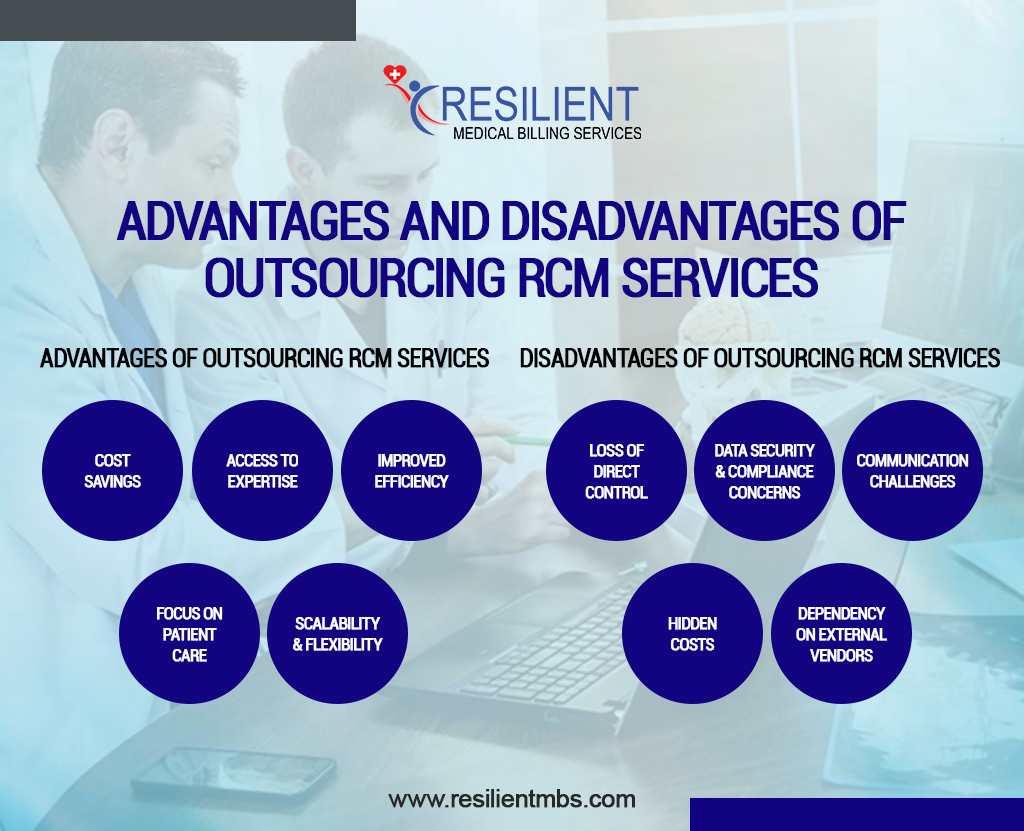Managing the financial side of healthcare is just as important as providing quality care. That’s where Revenue Cycle Management (RCM) comes in. It covers every financial step from the moment a patient books an appointment to when the final payment is received. This includes registration, insurance verification, coding, billing, and collections.
A robust Revenue Cycle Management (RCM) system is crucial for maintaining a healthcare practice’s financial health. Research shows that claim denials cost U.S. providers more than $262 billion annually, and approximately 1 in 5 claims are denied the first time they’re submitted. Without proper RCM, practices often face late payments, frequent denials, and revenue losses that can put severe pressure on their operations.
To overcome these challenges, many healthcare organizations are now outsourcing their RCM services. By partnering with billing and compliance experts, providers can reduce errors, receive payment more quickly, and, most importantly, spend more time focusing on patient care instead of paperwork.
What Does Outsourcing RCM Mean?
Outsourcing RCM involves hiring a third-party company to manage financial tasks, including billing, claims submission, denial management, and collections. Some practices outsource the entire cycle, while others outsource only specific parts, such as coding or billing.
These RCM companies employ trained professionals and utilize advanced software to ensure claims are accurate, payments are processed more efficiently, and errors are minimized. By working as an extension of the practice’s team, they help reduce costs, improve efficiency, and maintain the practice’s steady cash flow.
Advantages of Outsourcing RCM Services
1. Cost Savings
Outsourcing RCM helps healthcare practices reduce expenses. Since there’s no need to hire and train a large in-house billing team, organizations save money on salaries, staff training, and office space.
2. Access to Expertise
RCM outsourcing companies have experienced professionals who understand medical coding, billing rules, and insurance requirements. Their knowledge helps prevent mistakes and keeps practices compliant with regulations.
3. Improved Efficiency
With specialized teams and advanced tools, outsourced RCM providers handle claims more quickly and with fewer errors. This increases the chances of claims being approved the first time and speeds up the reimbursement process.

4. Focus on Patient Care
When billing and administrative tasks are managed externally, doctors and staff can spend more time with patients. This not only improves patient satisfaction but also allows providers to deliver higher-quality care.
5. Scalability & Flexibility
Outsourced RCM services can easily adapt as a practice grows or changes. Whether a clinic is adding new services, expanding locations, or facing busy seasons, outsourcing makes it easier to adjust without the hassle of hiring more staff.
Disadvantages of Outsourcing RCM Services
While outsourcing revenue cycle management (RCM) offers many benefits, it is equally important to recognize the potential drawbacks before making a decision.
1. Loss of Direct Control
When billing and collections are handled externally, practices may have less oversight of daily operations. This can be challenging for providers who prefer to stay closely involved in every aspect of their financial processes.
2. Data Security and Compliance Concerns
Medical billing involves sensitive patient information, which is protected under HIPAA regulations. Sharing this data with a third-party vendor raises concerns about data breaches, confidentiality, and compliance. Ensuring that the outsourcing partner has strict safeguards in place is essential.
3. Communication Challenges
Working with an external team, particularly one located in different time zones, can lead to delays in communication and responsiveness. This may impact the resolution of billing questions or claim issues.
4. Hidden Costs
Some revenue cycle management outsourcing companies may present unclear pricing structures. Unexpected fees for additional services can increase costs and reduce the financial advantages of outsourcing.
5. Dependency on External Vendors
Relying heavily on an outside partner also comes with risks. Any disruptions in the vendor’s operations, such as staffing shortages or system issues, can directly impact a practice’s cash flow and financial stability.
How to Decide if RCM Outsourcing is Right for Your Practice
Before outsourcing your Revenue Cycle Management (RCM), it’s essential to assess your practice’s unique needs carefully.
Practice Size and Claim Volume
Large practices with numerous claims often save time and money by outsourcing, while smaller clinics may find that keeping billing in-house is sufficient.
Budget Considerations
Compare the costs of paying an in-house billing team versus outsourcing. Select the option that offers the most financial advantage in the long run.
Staff Workload
If your team is overwhelmed with billing tasks and struggling to keep up, outsourcing can reduce stress and allow them to focus more on patient care.
In-House vs. Outsourced RCM
Think about the advantages and disadvantages of both models. In-house billing provides more control, while outsourcing can enhance efficiency and lower costs.
Red Flags to Watch For
Be cautious when dealing with companies that are unclear about their pricing, don’t prioritize compliance with HIPAA, or refuse to share references from current clients.
Choosing the Right Outsourcing Partner
Picking the right company to handle your RCM is one of the most critical steps.
- Experienced And Reliable
Choose a company with proven experience, advanced technology, and a solid record of helping providers increase collections.
- Compliance and Transparency
Ensure they comply with HIPAA regulations and are transparent about all costs. Avoid companies with hidden fees.
- Questions to Ask
Before making a decision, ask about how they manage claim denials, their average turnaround times, staff training, and how they protect sensitive patient data.
Bottom Line
Outsourcing RCM services can help practices save money and get expert support. However, it also has downsides, including the loss of some control and potential security concerns. This option doesn’t work the same for everyone; each practice should assess its size, budget, and goals before making a decision.
Get in Touch With Resilient MBS to Outsource Your RCM Services
If you’re considering outsourcing, it’s essential to work with an honest company, adhere to the rules, and prioritize efficiency. Contact Resilient MBS LLC today to discover how their team can enhance your revenue cycle and address your practice’s specific needs.
Resilient MBS is here to simplify your Revenue Cycle And Strengthen your Practice.
FAQs
What does outsourcing Revenue cycle management services mean?
Outsourcing RCM services means letting an outside company handle your billing, claims, and payment collections. These RCM outsourcing companies help doctors and clinics get paid more quickly and with fewer errors.
Why do healthcare practices outsource revenue cycle management?
Doctors and clinics often outsource revenue cycle tasks to save money, reduce billing errors, and free up more time to focus on patient care instead of paperwork.
Are there any risks with outsourcing RCM?
Yes. Some risks include losing direct control of billing, concerns about data security, potential hidden costs, and excessive reliance on an outside company. That’s why it’s essential to select reputable revenue cycle management outsourcing companies.
How can I pick the right RCM outsourcing company?
Look for a company with healthcare experience, transparent pricing, HIPAA compliance, and good communication. Asking for references and verifying their track record can also be helpful.
Is outsourcing RCM good for small medical practices?
Yes. Small practices benefit significantly because outsourcing can reduce staffing costs and provide them with access to expert outsourced revenue cycle management services. Still, each practice should carefully weigh the pros and cons before deciding to outsource.










